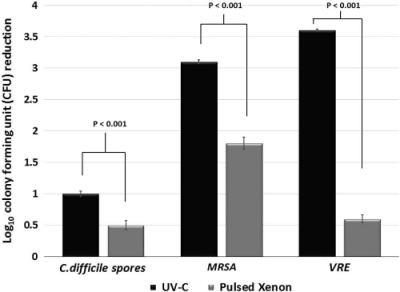Apr 1 2015
The efficacy of continuous UV-C disinfection robots versus pulsed xenon (PU-UX) was highlighted in a recently published study of ultraviolet (UV) light disinfection systems by an influential infection prevention research team, including Curtis Donskey, M.D.
 Graph 1 - Chart from VA Donskey study: Study results showing log reductions achieved by a UV-C and pulsed xenon devices when run for the same time (10 min.) at the same distance from glass microscope slides (4 ft). (PRNewsFoto/Infection Prevention Tecnologies)
Graph 1 - Chart from VA Donskey study: Study results showing log reductions achieved by a UV-C and pulsed xenon devices when run for the same time (10 min.) at the same distance from glass microscope slides (4 ft). (PRNewsFoto/Infection Prevention Tecnologies)
The study tested a continuous UV-C robot which was run for the same length of time from the same point in the room as a pulsed xenon (PU-UV) unit. The results showed surprisingly low pathogen kill rates for the pulsed xenon device, about .5 log for both C.diff and VRE, even as close as 4 feet (see photo). The continuous UV-C robot clearly demonstrated a much higher CFU reduction for the pathogens C.difficile, MRSA and VRE. The study states, "PX-UV was less effective than continuous UV-C in reducing pathogen recovery on glass slides with a 10-minute exposure time in similar hospital rooms" and "the UV-C device achieved significantly greater log10 CFU reductions than the PX-UV device" (emphasis added). It's important to note that not only did the continuous UV-C robot in the study show much stronger disinfectant results, but that it was not run for its entire cycle time.
The study calls attention to the dangers of trying to complete a disinfectant procedure too quickly and under-dosing as a result. The study states, "Although the PX-UV device reduced contamination on surfaces, residual contamination was not uncommon" and "the log reduction achieved by PX-UV on carriers at 10 minutes were relatively modest." "In an effort to speed up the cleaning process, EVS and IP staffs may be misleading themselves about how well the pulsed xenon treated rooms are really disinfected," says Kenny. "Hospitals must be wary of bold claims of speed and efficacy made by manufacturers of pulsed xenon units that simply don't stand up to scrutiny as clearly shown in the Donskey study. We're pleased with the results of the study as it unambiguously exposes the inherent weakness of the pulsed xenon units," he stated. Kenny added, "IPT's IRiS™ 3200m is over twice as powerful as the continuous UV-C device in the study and 25 times more powerful than the xenon pulse unit. Given that the pulsed xenon unit has to be moved around several times just to treat a single room, it really debunks the myth that pulsed xenon units are faster than continuous UV-C robots."
Effective dosage of the treatment area is a critically important factor when choosing a UV-C disinfectant system. Infection Prevention Technologies (IPT) IRiS™ robots employ real-time "Smart-Dose UV-C" technology to determine how long to treat a room taking the guess work away from the hospital staff. "Guessing how long to run your UV-C system is not good science. Unless you are measuring the UV-C dosage in real-time with UV sensors you may be under-dosing the room," stated Tom Kenny, CEO of Infection Prevention Technologies.
The study also points out that "the efficacy of PX-UV was dramatically reduced as the distance from the device was increased." The net effect is that pulsed xenon devices (PX-UV) require multiple treatments in a single room. The IRiS™ family of intelligent robots use patented "Power-Boost" and "Field Balancing™" technologies resulting in whole-room treatments and faster treatment times. These UV power enhancement technologies are designed to enable the IRiS UV-C robots to disinfect even shadow areas in a single treatment without moving the robot around.
Industry leading UV-C power from the IRiS™ family of intelligent disinfectant robots results in faster room treatments, whole room treatments, and more effective treatments.